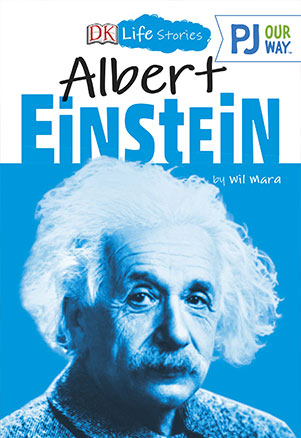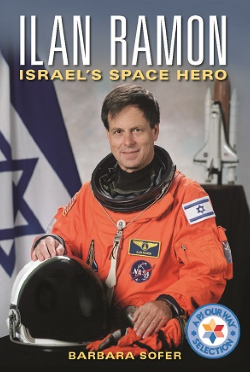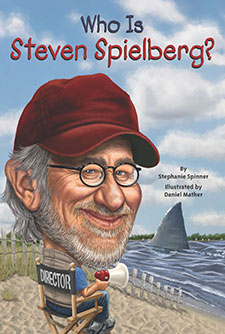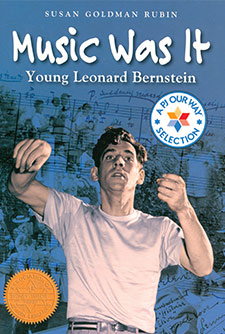DK Life Stories: Albert Einstein
Albert Einstein was one of the most brilliant scientists in history. But did you know that he never wore socks or that he loved playing violin, even though he wasn’t very good at it? Check out this biography of this eccentric Jewish genius!
Average Rating
( hint: Login to leave a review! )
117 Reviews
Leave Review
What the Book is About
Jewish Content & Values
Positive Role Models
Content Advisory
Talk it Over!
More for You
Part of the DK Life Stories series, this biography of Albert Einstein is filled with photographs, illustrations, and fascinating facts. In addition to details about Einstein’s life and work, this book offers a broader context of the world in which he was living, including information about World War II, Hitler’s rise to power, the making of the atomic bomb, and the creation of the State of Israel.
- As a child, young Albert enjoyed studying Hebrew and Judaism.
- Einstein raised money to support the nascent state of Israel and was offered the presidency in 1952.
- Einstein identified as a pacifist throughout his life. Although he wasn’t aware of the atomic bomb until after it was detonated, he regretted the role he played in its creation. After World War II, he founded the Emergency Committee of Atomic Scientists to encourage world leaders to work together for peace, or shalom.
- Einstein stood against racism, practicing the Jewish value of tzedek (righteousness). In his later years in Princeton, NJ, he joined the NAACP and helped African American individuals with housing and funding for college.
In addition to being a hardworking, brilliant scientist and a Nobel prize winner, Einstein was a devoted world citizen who used his celebrity status to help others. After he left Germany in 1933, Einstein worked with Winston Churchill to get as many Jewish scientists out of Germany as he could. Einstein and his second wife, Elsa Lowenthal, moved to the United States soon after, at which point they filled out visa applications for Jews trying to get to safety.
This book includes a brief biography of Adolf Hitler, his rise to power, and the anti-Semitism and destruction of World War II.
Albert Einstein described himself as a “militant pacifist,” or someone who is willing to fight for peace. What do you think that means?
Albert Einstein won the Nobel Prize in Physics in 1921 for his discovery of the law of the photoelectric effect. Since 1895, over 900 Nobel Prizes have been awarded in the fields of chemistry, literature, peace, physics, and physiology or medicine. At least 20% of Nobel Laureates have been Jewish; five of them (including Einstein) fled Nazi Germany to avoid persecution. The more well-known winners include Richard Feynman (Physics, 1965), Isaac Bashevis Singer (Literature, 1978), and Yitzhak Rabin and Shimon Peres (Peace, 1994). In 2018, Arthur Ashkin, an American Jew, became the oldest Nobel Laureate at age 96. He won the award in Physics for his work on optical tweezers at Bell Laboratories.
What the Book is About
Part of the DK Life Stories series, this biography of Albert Einstein is filled with photographs, illustrations, and fascinating facts. In addition to details about Einstein’s life and work, this book offers a broader context of the world in which he was living, including information about World War II, Hitler’s rise to power, the making of the atomic bomb, and the creation of the State of Israel.
Jewish Content & Values
- As a child, young Albert enjoyed studying Hebrew and Judaism.
- Einstein raised money to support the nascent state of Israel and was offered the presidency in 1952.
- Einstein identified as a pacifist throughout his life. Although he wasn’t aware of the atomic bomb until after it was detonated, he regretted the role he played in its creation. After World War II, he founded the Emergency Committee of Atomic Scientists to encourage world leaders to work together for peace, or shalom.
- Einstein stood against racism, practicing the Jewish value of tzedek (righteousness). In his later years in Princeton, NJ, he joined the NAACP and helped African American individuals with housing and funding for college.
Positive Role Models
In addition to being a hardworking, brilliant scientist and a Nobel prize winner, Einstein was a devoted world citizen who used his celebrity status to help others. After he left Germany in 1933, Einstein worked with Winston Churchill to get as many Jewish scientists out of Germany as he could. Einstein and his second wife, Elsa Lowenthal, moved to the United States soon after, at which point they filled out visa applications for Jews trying to get to safety.
Content Advisory
This book includes a brief biography of Adolf Hitler, his rise to power, and the anti-Semitism and destruction of World War II.
Talk it Over!
Albert Einstein described himself as a “militant pacifist,” or someone who is willing to fight for peace. What do you think that means?
More for You
Albert Einstein won the Nobel Prize in Physics in 1921 for his discovery of the law of the photoelectric effect. Since 1895, over 900 Nobel Prizes have been awarded in the fields of chemistry, literature, peace, physics, and physiology or medicine. At least 20% of Nobel Laureates have been Jewish; five of them (including Einstein) fled Nazi Germany to avoid persecution. The more well-known winners include Richard Feynman (Physics, 1965), Isaac Bashevis Singer (Literature, 1978), and Yitzhak Rabin and Shimon Peres (Peace, 1994). In 2018, Arthur Ashkin, an American Jew, became the oldest Nobel Laureate at age 96. He won the award in Physics for his work on optical tweezers at Bell Laboratories.




